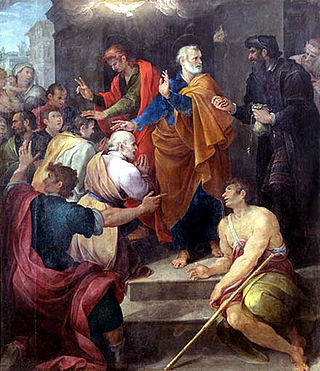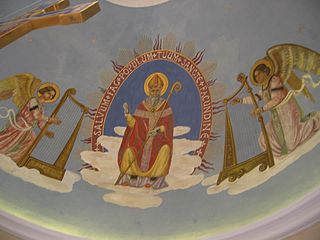
The Rocca Flea (Italian : Flea Castle) is a fortified palace in Gualdo Tadino, Umbria, central Italy. It is located in the upper part of the hill on which the town lies.

The Rocca Flea (Italian : Flea Castle) is a fortified palace in Gualdo Tadino, Umbria, central Italy. It is located in the upper part of the hill on which the town lies.

Although it has been speculated that its construction could date to Lombard times, what is known with certainty is only that it predates the town's reconstruction in 1237. In 1242 it was rebuilt by Frederick II and was later frequently renovated: in 1350, during the Perugine domination, a central keep (Cassero) was added, while a few years later other intervention were carried on by Biordo Michelotti.
Cardinal Antonio Maria Ciocchi del Monte lived in the fortress from 1515 to 1533.
During the Renaissance the Rocca became a patrician residence, but in 1888 was turned into a prison.
It is now the seat of a ceramics museum and of an historical exhibition. Rocca Flea Museum official web site

Gualdo Tadino is an ancient town of Italy, in the province of Perugia in northeastern Umbria, on the lower flanks of Monte Penna, a mountain of the Apennines. It is 47 kilometres (29 mi) NE of Perugia.

Acqualagna is a comune (municipality) in the Province of Pesaro e Urbino in the Italian region Marche, located about 70 kilometres (43 mi) west of Ancona and about 40 kilometres (25 mi) southwest of Pesaro. As of 31 December 2004, it had a population of 4,304 and an area of 50.8 square kilometres (19.6 sq mi). It is one of the main centers in Italy for truffle. The Candigliano is joined by the Burano in the vicinity of the town.

Sigillo is a comune (municipality) in the province of Perugia in the Italian region Umbria, located about 35 km northeast of Perugia.

Valfabbrica is a comune (municipality) in the Province of Perugia in the Italian region Umbria, located about 20 km northeast of Perugia. As of 31 December 2004, it had a population of 3,542 and an area of 92.1 km2 (35.6 sq mi).

Avanzino Nucci was an Italian painter of the late-Renaissance period.

A rocca is a type of Italian fortified stronghold or fortress, typically located on a hilltop, beneath or on which the inhabitants of a historically clustered village or town might take refuge at times of trouble. Generally under its owners' patronage, the settlement might hope to find prosperity in better times. A rocca might in reality be no grander than a fortified farmhouse. A more extensive rocca would be referred to as a castello.

The Diocese of Assisi-Nocera Umbra-Gualdo Tadino is a Latin diocese of the Catholic Church in Umbria, has existed since 1986. In that year the historic Diocese of Assisi, known as the birthplace of Francis of Assisi, was combined with the Diocese of Nocera Umbra-Gualdo Tadino. The diocese is a suffragan of the Archdiocese of Perugia-Città della Pieve.
Associazione Sportiva Gualdo Casacastalda is an Italian association football club, based in Gualdo Tadino, Umbria and also representing Casacastalda, a frazione of Valfabbrica, Umbria. The club currently plays in Prima Categoria Umbria.

Matteo da Gualdo or Matteo di Pietro di Ser Bernardo was an Italian painter, active in Gualdo Tadino, Nocera Umbra, and Assisi.

Gualdo Tadino Cathedral is a Roman Catholic cathedral in Gualdo Tadino in Umbria, Italy, dedicated to Saint Benedict of Nursia. Formerly a Benedictine abbey church, it became a cathedral in 1915, and is now a co-cathedral in the diocese of Assisi-Nocera Umbra-Gualdo Tadino.

San Francisco is a Gothic-style, Roman Catholic church located in Piazza Martiri della Libertà of Gualdo Tadino, region of Umbria, Italy. It is located opposite to the Cathedral of Gualdo Tadino.
The Rocca di Mondavio or Rocca Roveresca di Mondavio is a 15th-century castle in the town of Mondavio, in the region of Marche, Italy. The castle is now two museums.

.
The Diocese of Gualdo Tadino was a Roman Catholic diocese located in the town of Gualdo Tadino in the province of Perugia in northeastern Umbria, on the lower flanks of Mt. Penna, a mountain of the Apennines. In 1915, it was united with the Diocese of Nocera Umbra to form the Diocese of Nocera Umbra-Gualdo Tadino. Other sources indicate that it was suppressed to the Diocese of Nocera Umbra in 1066.
Giacomo Minutoli or Jacques Minutoli was a Roman Catholic prelate who served as Bishop of Agde (1476–1485) and Bishop of Nocera Umbra (1472–1476).
Giovanni Cerretani was a Roman Catholic prelate who served as Bishop of Nocera Umbra (1476–1492).
Virgilio Fiorenzi or Virgilio Fiorentini (1560–1644) was a Roman Catholic prelate who served as Bishop of Nocera Umbra (1605–1644).

The church of Saint Maria Assunta is a Catholic parish church in Nocera Umbra, in Umbria, and co-cathedral of the diocese of Assisi-Nocera Umbra-Gualdo Tadino.

Hana Purkrábková was a Czech ceramist and sculptor.

San Facondino is an originally Romanesque-style, Roman Catholic church located on the via of the same name just north outside of the urban center of Gualdo Tadino, region of Umbria, Italy. The church has undergone numerous modifications over the centuries.
43°13′59″N12°47′19″E / 43.23306°N 12.78861°E